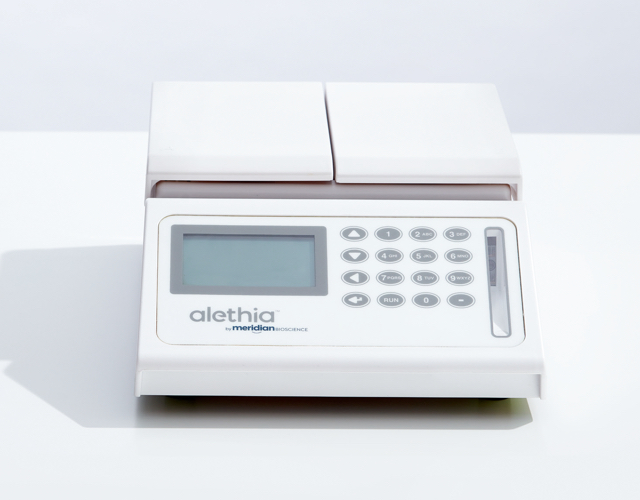Definitive answers, confidence in results
Definitive answers, confidence in results
Related Tests
- Healthcare Acquired Infections Alethia® C. difficile
- Pediatric & Neonatal Alethia® CMV Alethia® Group B Streptococcus
- Respiratory Alethia® Mycoplasma Direct Alethia® Pertussis Alethia® Group A Streptococcus
- Sexual Health Alethia® HSV 1&2
Support & Documents
Downloadable PDFs
Webinars & Videos
FAQs
- 40% of all community-acquired pneumonia is associated with Mycoplasma pneumoniae
- An estimated 2 million cases of Mycoplasma pneumoniae occur annually in the US
- IDSA guidelines for community-acquired pneumonia recommend immediate antibiotic therapy
- Typical antibiotics for respiratory infections including penicillin are ineffective in treating Mycoplasma pneumoniae due to the lack of cell wall, Chronic Mycoplasma pneumoniae infection may be linked to chronic asthma, Empiric treatment may lead to antimicrobial resistance
No distinctive X-Ray pattern of Mycoplasma pneumoniae has been found and marked differences exist in its radiographic appearance, making it an insufficient diagnostic tool with as low as 29% sensitivity.
- Serology may only detect 25% of positives during the first week and 56% of positives during the second week of infection.
- IgM antibodies may not be produced:
- Until 1-2 weeks after symptom onset
- On reinfection
- In very young children.
- Macrolides are the treatment of choice for Mycoplasma pneumoniae
- Tetracyclines and fluoroquinolones are also effective in the treatment of Mycoplasma pneumoniae in adults, however, they are not recommended for children under normal circumstances.
- Targeted detection for targeted treatment
- Simple sample preparation from throat swabs
- Positive agreement of 96.0% means fewer false negatives
- Direct molecular methods detect up to 4X more positives than serology
Alethia® Mycoplasma Direct – 87581
1. Waites, K.B., Mitchell F.B., and Atkinson, T.P. New insights into the pathogenesis and detection of Mycoplasma pneumoniae infections. Future Microbiology (2008): 635-648.
2. Centers for Disease Control and Prevention: National Center for Immunization and Respiratory Diseases, Division of Bacterial Disease. Mycoplasma pneumoniae Infection: History and Disease (2016). https://www.cdc.gov/pneumonia/atypical/mycoplasma/about/index.html
3. Mandell et al. Infectious Diseases Society of America/American Thoracic Society Consensus Guidelines on the Management of Community-Acquired Pneumonia in Adults. CID 2007; 44(S27-72).
4. Martin, R.J., J.M., Kraft, M., Chu., H.W. et al. A link between chronic asthma and chronic infection. Journal of Allergy and Clinical Immunology 107.4 (2001): 595-601.
5. Centers for Disease Control and Prevention: National Center for Immunization and Respiratory
10. Nilsson, A.C., Björkman, P., and Persson, K.. Polymerase chain reaction is superior to serology for the diagnosis of acute Mycoplasma pneumoniae infection and reveals a high rate of persistent infection. BMC Microbiology 8.1 (2008): 93.
11. Loens, K., & Ieven, M. Mycoplasma pneumoniae: Current Knowledge on Nucleic Acid Amplification Techniques and Serological Diagnostics. Frontiers in Microbiology 7.448 (2016)
12. Graffelman, A. W., Willemssen, F. E., Zonderland, H. M., et al. Limited value of chest radiography in predicting aetiology of lower respiratory tract infection in general practice. The British Journal of General Practice, 58.547 (2008): 93–97.13. Medjo, B., Atanaskovic-Mark
13. Medjo, B., Atanaskovic-Markovic, M., Radic, S., et al. Mycoplasma pneumoniae as a causative agent of community-acquired pneumonia in children: clinical features and laboratory diagnosis. Italian Journal of Pediatrics. 40.104 (2014).
Pricing
To order, contact your regional sales representative or use the following contact information:
- Email: sales@meridianbioscience.com
- Phone: +1 800 696-0739
- International Sales Extension: +1 513 271-3000

